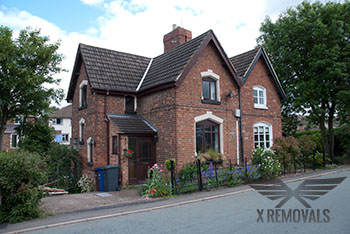
Stuck In the Property Chain
What is the property chain?
Property buyers and sellers in Great Britain would be well familiar with the term ‘property chain’. The property chain can be explained as the sequence of events (transactions etc.) involved in selling and buying a given residential or commercial property. The problem with the property chain is that all the stages or links along the chain are interrelated and dependent on the previous and following sell or purchase. Here is how the property chain works in reality – person A is selling their home, they need to sell it in order to have the funds to buy another house from person B. At this stage person B is looking to sell their house (to person A) in order to raise the funds to buy another house from person C (a third link in the property chain). If one of these links breaks, for instance person A is unable to sell their house, or alternatively person A doesn’t own a house and is looking to obtain mortgage but is unable to, then the transaction between person B and person C also fails, as both of them are dependent on a successful transaction between persons A and B. In real estate, this is known as the domino effect – as said, if one link or stage along the chain fails, the rest will also tumble down like well, dominos. Indeed this sounds a bit confusing, but in reality the property chain is a very logical and structured process. Problem with the property chain though is getting stuck in it.
How to avoid getting stuck in the property chain
 This might be easier said than done, but there are ways to do this. Avoiding the property chain altogether is one of the possible solutions, though this is an unlikely scenario for most people, as only about ten percent of all property transactions in the UK are ‘chain-free’, and usually reserved for high end real estate transactions where securing funds and mortgages is not really an issue. Here are some things to consider when looking to avoid getting stuck in the property chain:
This might be easier said than done, but there are ways to do this. Avoiding the property chain altogether is one of the possible solutions, though this is an unlikely scenario for most people, as only about ten percent of all property transactions in the UK are ‘chain-free’, and usually reserved for high end real estate transactions where securing funds and mortgages is not really an issue. Here are some things to consider when looking to avoid getting stuck in the property chain:
- Work with an experienced and reputable estate agent – indeed there are many good and reliable estate agents out there, but not all of them have the resource and connections to establish the necessary background and assurances concerning the other parties involved in the chain.
- Ask the estate agent representing you in the deal to do background checks and confirm that a mortgage or other type of lend is indeed feasible for the property being sold in order to purchase yours. Insist your agent contact the other party’s agent for all relevant, up to date information and that the property being sold qualifies for lending.
- Another easy way to filter out unsuitable parties, and minimise the risk of getting stuck in the property chain is to have your estate agent advertise and make the place available for viewings only to persons who aren’t involved in any ‘property chain relations’ i.e. they aren’t pending on a mortgage or other type of loan, or they aren’t selling their property to buy yours etc. First time home buyers are an example of potential buyers who aren’t part of the property chain (yet).
- People selling their property can avoid entering the chain by completing the sale but postponing the immediate purchase of another home. If one can afford to stay with relatives, or rent short term, this will give better perspective over the market, allow things to calm down immediately after the sale. Alternatively people can also wait before actually selling their current property in order to find a really suitable place to buy and move to – this will avoid entering the chain as well.
When does the property chain end?
Usually, the property chain ends with selling a given house without depending on its owners buying another house to move into. Here are some examples of how and where the property chain ends:
- A household moves into a vacant house, it could be a newly built house or its occupants might have passed away, or perhaps tenants have moved out.
- A household moves together with an existing household (children return to live with parents);
- A household occupies a temporary accommodation until they choose their next house to buy;
- A household moving into rental accommodation;
 Buying or selling a house in the UK is hair raising experience these days, and requires lots of additional spending (like thousands of pounds spent on surveyor services). Many people dread the complications, red tape and uncertainty of entering the property chain (if it cannot be avoided that is) but keeping cool, not rushing steps and doing your homework should help greatly. Keeping the estate agent on a short leash will also ensure people are getting the right information timely. The problematic housing market in the UK is yet to be affected by the recent Brexit events, which way things are going to go though is an unknown at this stage. Best piece of advice to buyers and sellers – don’t rush, don’t panic and try and consider each step of the process from as many angles as possible before committing to anything. In some cases, the best way to avoid getting stuck in the property chain is to break away from it. True this would inconvenience all other parties along the chain, but it will protect you and your assets. Once again, the importance of working with the right estate agent is not to be underestimated – you need the right people and expertise on your side. In an ideal world, it makes sense to do the whole selling and buying thing in one go, but this rarely is the case so be wise and aware when entering and making your way through the property chain.
Buying or selling a house in the UK is hair raising experience these days, and requires lots of additional spending (like thousands of pounds spent on surveyor services). Many people dread the complications, red tape and uncertainty of entering the property chain (if it cannot be avoided that is) but keeping cool, not rushing steps and doing your homework should help greatly. Keeping the estate agent on a short leash will also ensure people are getting the right information timely. The problematic housing market in the UK is yet to be affected by the recent Brexit events, which way things are going to go though is an unknown at this stage. Best piece of advice to buyers and sellers – don’t rush, don’t panic and try and consider each step of the process from as many angles as possible before committing to anything. In some cases, the best way to avoid getting stuck in the property chain is to break away from it. True this would inconvenience all other parties along the chain, but it will protect you and your assets. Once again, the importance of working with the right estate agent is not to be underestimated – you need the right people and expertise on your side. In an ideal world, it makes sense to do the whole selling and buying thing in one go, but this rarely is the case so be wise and aware when entering and making your way through the property chain.
Listed below – UK real estate transactions in figures
| Total unique homes for sale | 493 180 homes |
| Average asking price of property for sale | 400 166 GBP |
| Average time on market | 163 days |
| Total value of property for sale | 196 651 532 919 GBP |
| Properties viewed by homebuyers last month | 3 482 148 |

Sorry, the comment form is closed at this time.